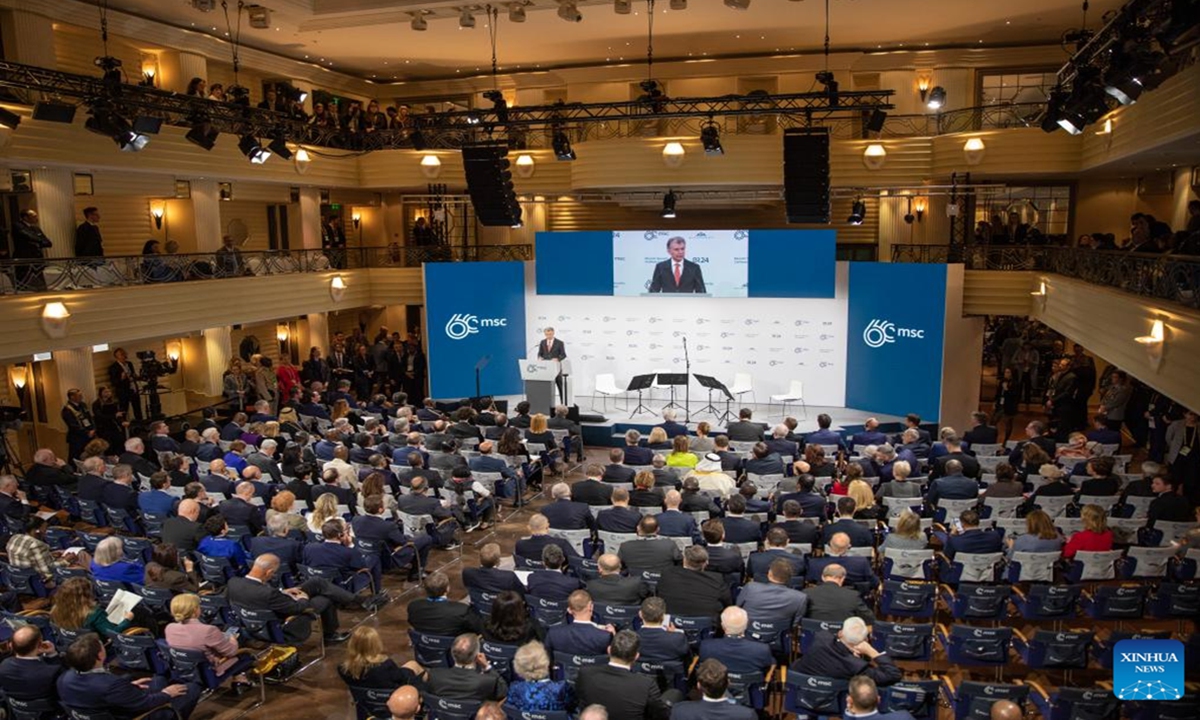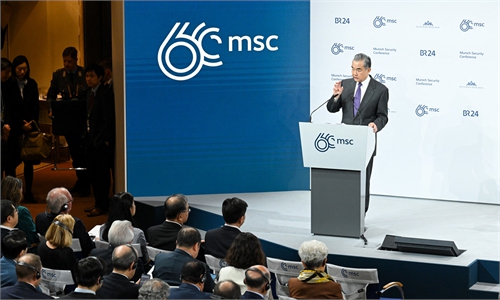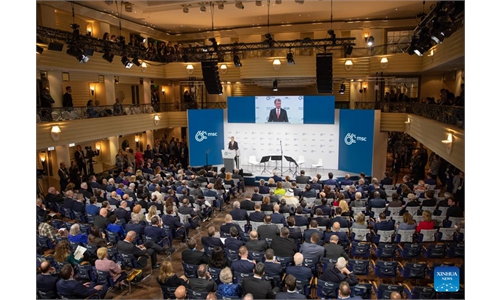
Munich Security Conference (MSC) Chairman Christoph Heusgen speaks during the opening of the 60th MSC in Munich, Germany, Feb. 16, 2024. Photo: Xinhua
The Munich Security Conference (MSC) 2024 ended on Sunday. This year, the forum marks its 60th anniversary, but this "achievement" has failed to dilute the pessimistic atmosphere inside and outside of the conference venue, as the West is concerned about various geopolitical events, ranging from conflicts in Ukraine and the Middle East, the Red Sea crisis, political turmoil in the Sahel region in Africa to the security of the Indo-Pacific region. The West has also included topics such as the global economy, climate change and technological innovations in its security vision.Yet, despite the intensive discussions on a wide range of topics during this year's MSC, due to its biased positions and divergent interests, it is difficult for the West as a whole to reach a consensus. If Western countries fail to update their political positions and policy logic according to the current circumstances, they are likely to continue being stuck in a "lose-lose dilemma."
In terms of the theme and agenda, this year's MSC strived to be more rational, trying to find a systematic and structural explanation for frequent conflicts and crises around the world. However, the discussions held during the meetings indicate it is difficult to alter the positions of both Europe and the US on their security dilemma.
For example, acknowledging the important role of the Global South, the West is still bent on adhering to the Western-centric perspective in terms of political stance and policy logic.
It still avoids the important issues in analyzing the root causes of the geopolitical security dilemma, blaming the major contradictions on external changes. And it still upholds the zero-sum thinking of competition and even confrontation when discussing security issues in the fields such as economy, science and technology.
MSC has always been the main platform for strategic dialogue and policy coordination between Europe and the US. As the West is anticipated to experience unpredictable political changes, how to seek good "transatlantic coordination" is of greater importance at this year's MSC. Europe and the US are already deeply divided internally, and it is even more difficult to reach consensus on other geopolitical conflicts.
It is also the main goal of the West to utilize the MSC to seek consensus among the Global South. However, when the West ignores the legitimate demands of these countries for the right to development and equal sharing of benefits, it is difficult to gain the trust and support of the Global South by solely relying on condescending rhetoric such as "the rules-based order."
The Munich Security Report released before the start of the conference contains massive data and case analysis, puts forward lose-lose dynamics that are spurred in global security, and accordingly proposes to curb the relative payoffs of zero-sum games and promote positive-sum cooperation. A simple truth is that countries gain from cooperation and lose from confrontation. Although the West has certain rational thinking, it still faces huge obstacles in transforming its thinking into concrete policies and actions.
First, in order to turn to positive-sum cooperation, the West should abandon the narrow-minded and outdated "West-centered" notion, which is totally contrary to the general trend. The MSC previously judged the current situation as "de-Westernization," but the policy in Europe and the US in recent years is in the direction of "re-Westernization." This kind of flip-flop will only reinforce the West's image of clinging to bygone values, and will only make Europe and the US go their separate ways amid security challenges, which will ultimately lead to a more volatile situation.
Second, in order to extricate itself from the security dilemma and create conditions for reducing the global security deficit, the West should change the logic of solving problems through the single means of military. In the discussions on the Ukrainian crisis at this MSC, opposition to Russia still prevailed, and the voices of seeking a political and diplomatic solution were hardly heard. There is a growing imbalance in the West between its policy goals of development and security and its policy instruments of military and diplomacy.
Finally, in order to avoid a lose-lose situation, the West should effectively curb its impulse to transfer internal contradictions outward, and avoid engaging in pan-securitization and pan-politicization. For Europe and the US, this year's biggest security challenge is essentially how to deal with the political risks brought about by Donald Trump and some European populist parties. Blaming the outside world for problems that cannot be solved internally will only further jeopardize the political mutual trust among different countries. Ultimately, it will aggravate the imbalance in international order, and exacerbate the lose-lose dilemma of international security.
The author is a professor with the Academy of Regional and Global Governance, Beijing Foreign Studies University. He was one of the Chinese attendees of this year's MSC. opinion@globaltimes.com.cn


